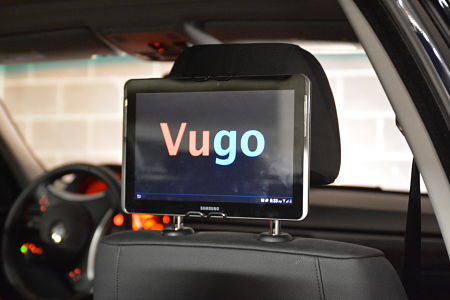Ride hail giant Uber, valued at upwards of $60 billion, and Asian rival Didi Chuxing, valued at $25 billion, have already carried more than three billion passengers in the relatively short lifespan of the ride hail industry.

Now, autonomous vehicles are edging into the picture with car manufacturers and ride hail companies pairing off to see which team will put the first autonomous ride hail vehicle into mass production.
The vision of the future clearly paints a picture of most travelers as passengers in vehicles that drive themselves.
Far from the stuff of science fiction, these cars are already moving on our streets and highways, being tested.
And that’s where Vugo comes in. The Minnesota-based ride-hail advertising platform is trying to create a business model where advertisers pay for the ride and passengers ride free in exchange for being captive audiences for advertisers.
Founded in 2015 with $200,000 in seed money, Vugo currently operates primarily in Uber vehicles, running ads on a tablet that drivers purchase themselves and keep in the back seat to earn extra income on each ride.
The driver takes a 60 percent cut of Vugo’s advertising revenue, which is built on an ad industry-standard cost-per-impression price structure. The rate shifts with market conditions, but it hovers at about $25 per 1,000 impressions. For a driver, this adds up to approximately $100 to $300 in additional income each month when driving full-time.
For the passenger, the tablet is free entertainment a few ads mixed in. Vugo’s main selling point is its “TripIntent” technology, an algorithm that culls insights about passengers’ consumer tendencies based on the entertainment they choose, current location, and planned destination in order to deliver more tailored content.
Early speed bumps for Vugo came in New York and Chicago where regulators banned the car hail advertising because Taxi and Limo Commission Rules prohibit advertising in "for-hire vehicles," a category which includes vehicles dispatched by applications like Uber and Lyft.
Vugo has filed lawsuits, seeking a declaration that the TLC advertising bans violate the First Amendment to the United States Constitution, and is seeking an injunction barring the cities from enforcing the bans.
In a release, Vugo’s attorney, Jeffrey Schwab, said the ban on advertising in the vehicles operated through the ride-hailing services amounts to the cities improperly “picking winners and losers in the economy.”
“We founded Vugo because we believed there was a genuine opportunity for ridesharing drivers to enhance their customers’ ridesharing experience. Vugo allows ridesharing drivers to provide riders with tailored media, restaurant recommendations and information about local experiences,” said Rob Flessner, CEO and co-founder of Vugo. “Ridesharing drivers are best equipped to determine the preferences of their riders, not the cities,” he added.
Vugo co-founder James Bellefeuille says it’s all about the passenger.
“Vugo monetizes via advertising, but is 100 percent focused on improving the passenger experience through Vugo's Mobility Media. We think that occupants of driverless cars will be less concerned with driving as ridesharing and mobility-as-a-service solutions replace the driving experience. Today people are becoming passengers more than ever before, and no longer concerned with actively driving, navigation or avoiding accidents will seek ways to fill their time with engaging content and entertainment,” he said. “We have been working towards making the passenger experience better by using data, content relationships and passenger engagement to improve the experience while also using data to further monetize the for-hire cars for drivers and fleet owners,” he added.
